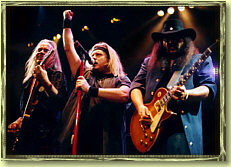| |
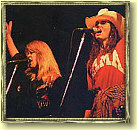 |
This
was the real future of rock 'n' roll, destined
not for Hollywood fame but for blood, tragedy,
redemption and, ultimately, survival on its own
terms. The band was derailed by the infamous 1977
plane crash that killed Van Zant, Steve Gaines,
the guitarist who replaced Ed King, and
his sister, vocalist Cassie Gaines. A decade
later, the remaining members reassembled for a
tribute to Lynyrd Skynyrd, with Ronnie's youngest
brother Johnny singing.
That band, after a few more changes, is still
going strong.
Twenty-five years after that memorable debut,
Lynyrd Skynyrd played a pair of shows at
New York's Beacon Theater that bristled with the
energy of a new band trying to prove itself.
|
The following
interview took place after the first night, with all nine
members offering their observations on Skynyrd history;
vocalist Johnny Van Zant, guitarists Gary Rossington,
Rickey Medlocke and Hughie Thomasson, keyboardist Billy
Powell, bassist Leon Wilkeson, drummer Jeff McAllister
and background vocalists Dale Krantz-Rossington
and Carol Chase.
You guys were obviously having a lot of fun out
there last night.
Johnny Van Zant:
We've been having a real good time. We've been at this
over 11 years now.
I've been in the band longer than Ronnie was.
Gary, you used to talk about how you first got
together through playing baseball.
Gary Rossington:
Me and Bob Burns had a little band, and Ronnie was in a
band called Us, and Allen was in a band called the Mods.
Our band was called Me You And Him. Larry Junstrom played
with us. Me and Bob went to watch Ronnie play baseball
one time; he was on one team, and we were on a team
called the Mustangs. We were right on the third-base
line, and Ronnie hit a line drive and wham it hit Bob
Burns right in the head and knocked him out.
Ronnie thought he'd killed him, so he came runnin' over.
Then we went back and talked, and
we went over to Bob's house. Ronnie just lived
down the street. He saw the drums and the guitar,
and we just started playing "Last Time"
by the Stones and "Gloria." We got a
band up that day, and we went and got Allen
Collins. He was riding his bike down the street.
Ronnie was the badass of the town, and he had
this big old redMustang.
Me and Bob were in it going down the road, and we
saw Allen, and Bob went, "Hey, that guy's
got a guitar, and he's pretty good, Ronnie."
We were looking for anybody with equipment.
So we pulled up and yelled "Hey Allen!,"
and he saw Ronnie, and Bob was pretty bad at the
time too, so he took off, riding his bike out in
the woods, threw his bike down and climbed
up a big old oak tree.
The rest of us are saying, "Come on down, we
only want you to play with us," but he
thought Ronnie was gonna beat him up. So we
started to play music together 'cause we liked
the Beatles and the Stones, the Yardbirds, and we
started to dream, and the dream came true. |
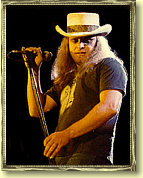
Ronnie Van Zant |
Billy Powell:
I played guitar in Leon's band, the Little Black Eggs. I
had been taking classical piano lessons for years, then
one day I decided to pick up the guitar, and we started
this band the next day. We only knew one song.
Allen Collins later taught me how to play "Light My
Fire."
Leon Wilkeson:
Little did we know that we were gonna end up with a band
as famous as Lynyrd Skynyrd.
Johnny, you watched these guys at rehearsals as a
kid, right? What was that like?
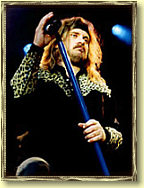
Johnny Van
Zant |
Van Zant:
I just thought it looked like fun, y'know. It was
kind of like any other family,
except around our house it was just music. I
guess it's like a family of lawyers or doctors,
they're always talkin' medicine or whatever. Our
family was always talking music.
Was there a point where, as a kid, you
said, "I gotta get in on this"?
Van Zant:
I started out playing drums; that's what I wanted
to do, because I always loved being
around the bands and jumping on the drum set;
every kid loves doing it.
After a while, people would tell me, "You
can sing, go on and sing." I think I was too
shy,
that's why I liked to hang out in the back by the
drums. That all changed.
They rehearsed in the house, then in a trailer
behind the house.
So you would watch them. |
Van Zant:
Yeah. I was still young, I don't know how old I was. I
don't think any of us has a lot of formal schooling, but
we've had the street schooling. Sometimes, I think that
might be better. I was so young then, and they would
always say, "Don't curse around Johnny, don't talk
about chicks around Johnny," all that stuff. Gary
seemed real shy, he's always been kind of reserved and
shy; back then, if you look at pictures of them, he's
always got the hair down in front of his face. They
called him Prince Charming; he was popular with the girls.
Gary, one of the defining characteristics of
Lynyrd Skynyrd is the three-guitar interlace.
How did you develop that distinct sound?
Rossington:
There was only one other group that did that in a way we
loved; Buffalo Springfield had three guitars,
but they didn't all play at the same time. We would just
sit there for hours and play counter parts.
For instance, in "Sweet Home Alabama," there's
two or three different guitar parts that lock in
together, and if you just play one at a time it doesn't
sound right. You've got to hear them all together. We'd
sit there, one guy's playing one part, another guy's
pickin,' and they fit it in. They call it counter parts,
parts that interlock. We'd sit around all day doing that,
hoping to get it better and better. In the studio, we
would go in and put down a basic track, then everybody
would put their parts on, and then it would become a song.
It was a lot of work, and it still is today.
I remember the feeling of watching the band live
back then was like watching chaos;
there was a tremendous, pent-up anger that came flying
off the stage.
Rossington: [laughing]
It was chaos, all right. Back before the crash, with the
original band we were just kinda like kids still, in our
early 20s; we were just learning. We fought a lot though
and argued like brothers and sisters. Lives are hard to
get along with sometime, and we didn't get along with
some people. Now we're getting along real good. We even
go fishing on time off and go hang out. It's still chaos
on stage, though. There's a lot of chaos, and the energy
is still there too. Now there's a little less chaos. We
were newer then. We're a little more organized now, but,
it is still chaotic.
Rickey Medlocke:
I go back to 1970 to '73, when I played with them, and I
remember how everything was put together, and I remember
watching them. Even though I was the drummer then, I was
always able to watch Allen and Gary, how they put things
together. So, when I was forming ideas for the band, I
just said, "If it were Allen sitting in the room,
how would Allen have approached it?" and do it that
way. But it's always gonna come out Rickey Medlocke too.
Basically, that's how I approached it with this band.
You've got to have some insight into the people who were
there before, who gave it that essence; put yourself in
that position and write to that.
Hughie Thomasson:
I've known the Skynyrd boys since 1972. I started the
Outlaws in 1968. Our managers knew each other; we opened
for them at Mother's in Nashville. We've been good
friends ever since. The Outlaws ended up doing several
tours with
Skynyrd after that. The band would always invite me up to
jam on "...the Breeze" and a couple of songs,
so we've known each other since then. It wasn't like
walking into a band full of strangers for me, it was more
like joining up
with old friends.
Dale Krantz-Rossington:
I was from Detroit, so I don't think I really understood,
even though I was singing with 38 Special. We toured with
Skynyrd early in 1977. I really learned to appreciate
them when I stood at the side of the stage in '77, and in
about
20 seconds I got it when I saw Ronnie just kind of cruise
that stage, walking against the beat, just totally in
control.
I'll never forget the impact they had on me that night.
They were the most magical, frighteningly powerful band I
had ever seen.
Powell:
I was a roadie for the band for a year and had been
taking classical piano lessons since I was six years old.
I wired amplifiers for the band back then. One night,
after a high school prom in Jacksonville, there was this
old piano up there on stage, and after the gig I sat down
and played my version of "Free Bird," and
Ronnie's jaw dropped.
"You play piano like that, and you didn't tell us?"
he asked. I hadn't mentioned it before. Ronnie said,
"You wanna join the band?" It was my first
dream come true.We were going good, then the tragedy, Oct.
20, 1977, just took the rug right out from underneath all
of us.
Wilkeson:
For me, the plane crash was total instant amnesia, which
I count as a blessing.
Powell:
I guess I'm the one who's cursed with remembering
every detail. I wasn't knocked unconscious. It
was terrifying, it was unbelievably,
indescribably, don't-wanna-know terrifying. You
don't wanna know. When you know you're fixin' to
die in 15 minutes, gliding over the palm trees
and swamps, fixin' to die, it is terrifying.
There's nothing you can do about it. It felt like
being hit with 150 baseball bats while rolling
down a hill in a garbage can. I was getting hit
all over the place. On impact, every seat belt
broke. The nose cone was all the way off, a steel
rod went right through my arm. Leon was out cold,
all his organs were shoved up into his chest, his
teeth were knocked out. Here I am, trying to hold
my nose on my face over here. That's as far as
I'll tell you about it. For three years, all we
could do was ask why God did this at the peak of
our career. The ones up front were the most
critically injured and killed. The ones in the
back, some of us just got out and walked around
in a daze, in one or two feet of swamp mud with
the sun going down and alligators and snakes
everywhere. |
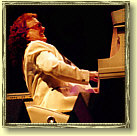 |
Rossington:
I have to think about it sometimes. People do ask me.
This is October, the reunion month and all that.
You do think about it. When something that dramatic
happens, you always think about it. You remember when
your parents die, when your first dog dies. My father
died when I was 10, that was the only big thing that ever
happened to me until then. You learn to live with it, you
have to in order to survive and not let it drive you
crazy. It did drive us to drinking and drugs for a while,
but now we're back. I don't really like to talk about it
just because all that stuff happens and everybody has a
different story of what they saw; there's a lot of freaky
things that happened from that. When you fall out of the
sky and people die all around you and you're in the
swamp, it's like Viet Nam or something, seeing all your
friends and family dead and screaming and metal and
flames, it's a heavy thing to lay there for hours waiting
for help. It's real weird, but God gives you the power to
forget all the bad things and the real bad hurts,
physical and emotional. You just learn to live with it. I
have. All the guys in the band now, they lived it through
us.
Jeff McAllister:
The band is a story of survival. The older members have
gone through so much in their lives; Hughie, Johnny,
Rickey, everyone has had the things they survived. Lynyrd
Skynyrd is a band about survival; we started over here
and came out the other end.
Van Zant:
Before I was ever asked to be a part of this, I was a fan
and, looking at it from a fan point of view, you have to
say it is a survival story.
Medlocke:
One night during the first tour, after I rejoined the
group, Gary looked over to me and said, "I wanted to
ask you this ever since you got back in the band. Where
were you that night? You were supposed to be with us that
week. Ronnie had invited you to go out and ride with us.
Where were you?" I was right down the road, playing
a club in Columbia, S.C. They were in Greenville, I was
in Columbia. When it happened, some guy came running into
the club, yelling about it. I quit and immediately went
back to the hotel room and got on the phone. Momma picked
it up, and she was in hysterics. I went through a period
for a while feeling guilty, that maybe if I had been
there something would have changed, I could have made the
difference somehow. Maybe it was my destiny.
Gary said, "You were meant to be here now."
I'm so glad to be back with Gary anyway, because he's
like a long-lost brother.
Powell:
Then we formed the Rossington Collins Band with Dale
singing the lead vocals.
Rossington:
We did that to kind of try to get away from being
compared to Lynyrd Skynyrd right off the bat.
Me, Allen and Ronnie were so close, we didn't want people
to think we were just gonna come right back out with
another singer; we had Paul Rodgers was gonna sing with
us, Ronnie Hammond, we talked with Gregg Allman,
but we went with Dale, a female; she was the perfect
choice.
Van Zant:
I was happy about that because Ronnie was my brother and
I couldn't see anybody taking his place.
But a woman singer was a whole different direction.
 |
Dale Krantz-Rossington:
It was an amazing time. I was a little background
vocalist from Indiana.
I had to sing from my toes because I was scared
to death of them, and that's the truth.
I was so scared of Gary and Allen. I had led a
band, but I had never written lyrics.
When they said, "Write a song," you did
because they told you to.
We opened the show for them in the spring of '77
with 38 Special, Donnie's band.
I was singing background vocals with my younger
sister at the time.
Two years after the crash, I was still working
with .38. They were throwing around some heavy
names, Paul Rodgers, Gregg Allman, but they were
so worried about falling into the comparison.
They burst through the door one night and said,
"Would you like to work with us?" I
said, "Yeah."
They said, "Do you write lyrics?" I
said, "Yeah," even though I hadn't
before, but it worked out. |
Rossington:
That was a great band, and we would have gone on except
there were so many other things. Allen's wife died,
pregnant; that drove him to drugs and drinking, just
terrible, and I was his best friend, so we were in it
together, and, boy, it was terrible. That had to end. I
get upset about Allen Collins; he kind of gets forgotten
about. You read more about Steve and Cassie than Allen
because he didn't die in the crash, but he was as big a
part of the band as Ronnie and me. We wrote all those
songs together.
Powell:
All we did was fight, fight, fight, because everybody was
so upset over the plane crash.
The band broke up, and Leon and I began playing with Mark
Farner in a Christian band.
Wilkeson:
I got out of the band I was playing in with Billy,
because I sensed something was fixing to happen with the
10-year anniversary of the tragedy. And it did.
Powell:
In 1986, the Rossington band was playing in Atlanta, and
we jammed with them at the Fox Theater at the end
of their set. We did "Sweet Home Alabama" and
"...Three Steps," and the place went nuts. We
brought the house down. So we talked to Charlie Brusco
about doing a tribute. Gary didn't want to do it at
first, Johnny didn't want to do it,
but we said it's 10 years on; we need to have a tribute.
Charlie agreed and talked to Gary; that's how we got the
wheels turning in 1987. It was going to be a short tour,
a six-week tour, but the magnitude of the tour was so
great
that here we are.
How hard was the decision to start over?
Powell:
Anybody's entitled to change their mind after 10 years;
we weren't on pain medication anymore, we weren't bitter.
Krantz-Rossington:
I knew that Gary had a really rough time with this [the
new Lynyrd Skynyrd] from '87 on.
He took this project on, assuming it was gonna last for
literally one week. We were going to do a tribute to
Lynyrd Skynyrd. Nobody at that time thought we'd do 100
shows, let alone come to grips with writing new material
under
that name. Every step of the way, this has been a big
step for Gary to take. But just in the last two years
with
Hughie and Rickey coming in, it has really worked. The
spark for Gary really was the guitar army, and I'm not
sure
he had found that and the camaraderie with the other
gentlemen that he did with Rickey and Hughie.
Man, they brought some life into this thing.
Gary was a big package to take on. I thought Skynyrd,
with all the ghosts and the emotional baggage, was only
going to be heartache for him. I wanna tell you I fought
it for a long time. I was afraid it was gonna somehow be
bigger than us, then it dawned on me about five years
into it that it definitely is bigger than all of us.
Skynyrd is huge, and once you kind of give up to it and
support it you can ride that wave. It's so huge, it's
bigger than the band, it's bigger than Gary and I. We
couldn't have fought this. It's got an energy of its own.
Van
Zant:
I never dreamt I would be playing with these guys.
Never wanted to really; that thought never
crossed my mind.
Even 10 years after the plane crash, it never
crossed my mind, until Gary actually came up to
me and said, "We wanna do something besides
it being
the last thing Lynyrd Skynyrd did was to have an
airplane crash."
The more I thought about that, the more I
realized that Ronnie put his life
and soul into this band, and he wouldn't have
wanted that to be the last
thing that the band ever did. It gives me great
pleasure to go out and sing songs he wrote. He
was a great writer, great singer, he was a
stylist.
It's pretty amazing that his songs still live on.
After we're all dead and gone, his songs will
live on. |
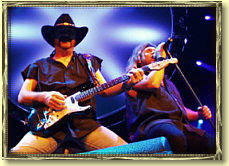 |
|
|
